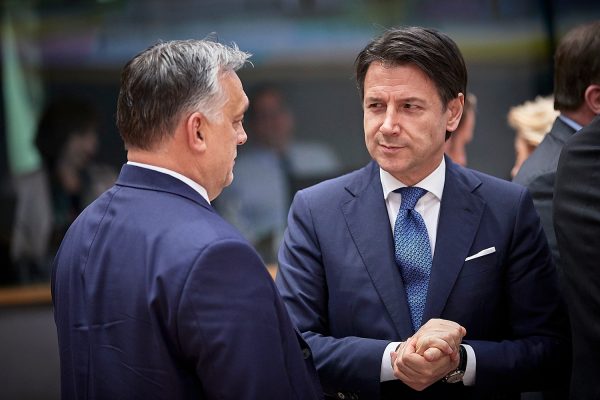
Hungary and Poland are holding up approval of the EU’s seven-year budget and coronavirus recovery fund, worth a combined €1.8 trillion, vowing to jointly veto so long as the rest of the bloc insists on tying funds to compliance with the rule of law.
The countries’ far-right governments, which are already being probed by the EU for politicizing their judicial systems, claim they are defending national sovereignty from foreign interference.
Viktor Orbán, the Hungarian prime minister, said he would not “subject Hungary to a situation where a simple majority imposes issues upon the Hungarian people they do not want.”
The problem with that statement: 25 of the EU’s 27 member states support the proposed rule-of-law conditionality, as do seven in ten Hungarians and Poles.
EU-wide support is as high as 77 percent, according to a poll commissioned by the European Parliament.
“The” people
It’s a reminder that leaders are not their countries. Populists like Orbán pretend to speak on behalf of “the people”, but he only has the support of half of Hungary.
Poland’s ruling Law and Justice party is polling at an average of 33 percent support, down from 44 percent in the last election. It has seen major protests against it in recent weeks over a proposal to tighten abortion laws.
Orbán has gerrymandered parliamentary seats, making it possible to win a two-thirds majority with under 50 percent support, and he is raising the minimum number of districts in which parties must compete from 27 to fifty out of 106, making it harder for small and regional parties to win.
Justice
Law and Justice hasn’t gone that far, but — like Orbán — it has undermined the independence of the judiciary in Poland by:
- Packing the Constitutional Tribunal, which tests the constitutionality of new laws, with loyalists;
- Trying to force Supreme Court justices into retirement, something the European Court of Justice prevented;
- Giving the justice minister the power to unilaterally dismiss court presidents;
- Creating a separate disciplinary chamber that can suspend judges; and
- Fining judges who question the government’s legal reforms under a new “muzzle law”.
The party claims it is purging holdovers from Poland’s communist regime, who are blocking the will of “the people”.
However, few judges are old enough to have served prior to 1989.
The real reason for the many changes is that an independent judiciary stands in the way of Law and Justice’s vision of an illiberal Polish democracy.
Tactics
Orbán and Law and Justice share other tactics.
Both have purged political opponents from government agencies and state-run companies.
Both have weakened the free press. Hungary fines journalists whose reporting is deemed “unbalanced”. Orbán’s allies have bought up critical newspapers and websites and turned them into government mouthpieces. Law and Justice has converted the previously independent public broadcaster into a propaganda channel.
Both scapegoat minorities. Orbán has deprived all but a few non-Christian churches of state funding and frequently inveighs against Muslim immigration. Law and Justice calls gay rights an “import” and has declared dozens of municipalities “LGBT-free zones”.
What’s at stake
EU leaders agreed in September to tie the disbursement of EU funds to compliance with the rule of law.
The conditionality is not automatic. To withhold money, a qualified majority of fifteen out of 27 member states, representing 65 percent of the EU’s population, must agree.
Only rule-of-law violations with budgetary implications would qualify.
For supporters, it’s the bare minimum the EU could do to protect the democratic values Hungary and Poland also committed to uphold when they joined in 2004. Leaders would still need to actively sanction two of their own, something they haven’t done so far. Current disciplinary procedures, which could see Hungary and Poland lose their voting rights in the councils of the EU, were initiated by the European Parliament.
But if the proposal were meaningless, Orbán and his Polish counterpart, Mateusz Morawiecki, wouldn’t be fighting it. They understand it could be used to rein them in — which is exactly why the rest of the EU must hold firm.
